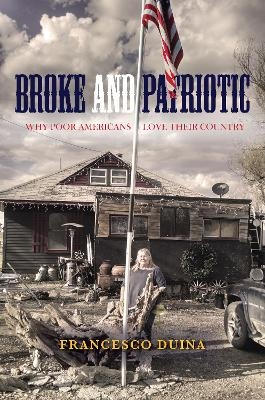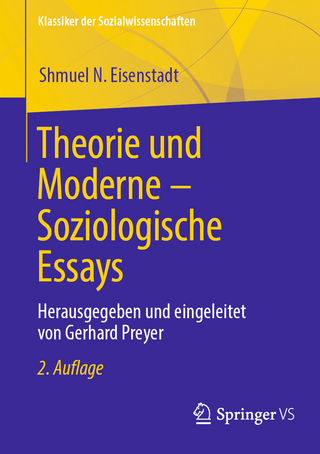
Broke and Patriotic
Stanford University Press (Verlag)
978-0-8047-9969-0 (ISBN)
In Broke and Patriotic, Francesco Duina contends that the best way to answer these questions is to speak directly to America's most impoverished. Spending time in bus stations, Laundromats, senior citizen centers, homeless shelters, public libraries, and fast food restaurants, Duina conducted over sixty revealing interviews in which his participants explain how they view themselves and their country. He masterfully weaves their words into three narratives. First, America's poor still see their country as the "last hope" for themselves and the world: America offers its people a sense of dignity, closeness to God, and answers to most of humanity's problems. Second, America is still the "land of milk and honey:" a very rich and generous country where those who work hard can succeed. Third, America is the freest country on earth where self-determination is still possible.
This book offers a stirring portrait of the people left behind by their country and left out of the national conversation. By giving them a voice, Duina sheds new light on a sector of American society that we are only beginning to recognize as a powerful force in shaping the country's future.
Francesco Duina is Professor of Sociology at Bates College, as well as Honorary Professor of Sociology at the University of British Columbia and Visiting Professor of Business and Politics at the Copenhagen Business School. He is the author of several books, including Winning: Reflections on an American Obsession (2011).
Contents and Abstracts1The Prehistoric Roots of the Modern Mind chapter abstractThis chapter presents an overview of the development and architecture of the human brain, and shows what evolutionary history has to do with the nature of cognition today. Drawing on the perspectives and techniques of evolutionary psychology, it pursues the following questions: (1) Given our ancestral world, what kinds of mental structures and functions should we expect to find in the brain, and do we? and (2) What roles do mental structures and functions formed in the Pleistocene world continue to play in "modern" minds? In the course of the discussion, it also outlines contemporary models of the mind—from the "blank slate" view to the idea of massive modularity—and surveys the range of intuitive knowledge (e.g., intuitive biology, intuitive physics, and intuitive psychology) and innate cognitive processes that both shape and constrain human thought.
1A People's Country chapter abstractChapter 1 introduces the key puzzle of the book—why are poor Americans patriotic?—and explains why we should try to answer it. Much, in fact, depends on that patriotism: the social order, the nature of inequality in the country, military recruitment, and America's sense of self and identity both at home and on the world stage. The patriotism of the poor can also be politically very salient, as seen during the presidential elections of 2016 and Donald Trump's victory. The chapter explains that extensive in-depth interviews were carried out in Montana and Alabama and summarizes the findings: America is a place of hope, the "land of milk and honey," and a country of freedom. Americans belong to the country; more important, however, the country still belongs to Americans. With much else in life a struggle, being American offers invaluable meaning and dignity.
2Broke and Patriotic chapter abstractChapter 2 presents evidence that poor Americans are by many measures, (such as Social Security benefits, intergenerational mobility prospects, working hours, and income and wealth gaps relative to middle and upper classes) worse off than the poor in other Organisation for Economic Co-operation and Development (OECD) countries. The American Dream is eluding them. At the same time, the American poor (even if we control for race, gender, or other dimensions) are extraordinarily patriotic. Indeed, their patriotism matches or exceeds that of the poor in other OECD countries and is equal if not superior to the patriotism of wealthier Americans. Data come from the World Values Survey, the General Social Survey, and other sources. Why do the poor hold such high levels of patriotism?
3Heading to Alabama and Montana chapter abstractChapter 3 notes that we know little about the patriotism of the poor. Research on related topics, however, can offer us initial potential insights. The chapter thus examines works on the origins, including the popular roots, and evolution of American patriotism through time. The chapter examines research on the patriotism of different types of marginalized Americans (women, African Americans, Native Americans) and considers research on social cohesion. It identifies the initial hypotheses for the book and then specifies the research methods used for investigation: for example, selection of sites (Alabama and Montana), selection of interviewees, and survey questions used. The chapter refers readers to the Appendix for further methodological details.
4The Last Hope chapter abstractChapter 4 explores the sentiments, held by most interviewees, that America is an exceptional, even transcendental, country: a place designed and intended to offer deliverance from the ills that have plagued humanity throughout history to this very day. America, in a word, represents hope, both for humanity and for each individual person in the country. The interviewees evoked pictures of oppressive and destitute places when describing other countries. America offers reprieve and the possibility of a better future. The idea of exceptionality was further reinforced by a belief that, while God is kind and loves everyone equally, he holds America in a special place in his heart: America is God's country. And with this there was also an almost tragic sense, described by several, that one has to believe in America: when all else seems to be a struggle, faith in country, and in America in particular, is a must.
5The Land of Milk and Honey chapter abstractIn Chapter 5, many of the people interviewed, despite their own lives' often difficult trajectories, took pride in America's great wealth and what, they felt, it means for the country's poor: an abundance of riches that allows everyone to survive, a feeling that one is being taken care of, and the conviction that anything is possible in America: despite their own lives' often difficult trajectories. America, they asserted, despite all their troubles, is the "land of milk and honey." Many of the interviewees spoke of the limitations of other countries: run-down, unable to provide for their people, and oppressive. Everyone still wants to come to the United States, they said. The country's natural beauty may play a role, too. Many expressed contentment with their lot. There were differences between interviewees in Alabama and Montana.
6Freedom chapter abstractChapter 6 discusses how "freedom" was the word that nearly all interviewees mentioned when accounting for their love of the United States. Questions of income, social status, or other metrics of personal success were secondary and often irrelevant. Freedom is at the heart of the American social contract. Freedom means individual self-determination, both physical and mental. Those in Montana infused this narrative with considerable libertarian themes; black interviewees in Alabama tended to point to progress in racial relations. Only America guarantees the right to bear arms. This is a matter of self-protection and rebellion against tyranny. But with guns one can also hunt and feed one's family. Many stressed that America's freedom was fought for, at great cost, by generations of Americans. To these we should add more localized patriotic narratives: a Confederate view of heritage in Alabama and an antigovernment version in Montana.
7Reconciling Poverty and Patriotism chapter abstractDid the interviewees feel a contradiction between their difficult life situations and love of country? Chapter 7 notes that there was no puzzle in their minds. They talked about the fairness of outcomes in life, their sense that new opportunities were about to come along (especially if one is walking with God), a conviction that everyone is worth the same regardless of wealth, and, finally, that the United States is really the only country they know. Taken together, these answers help complete the picture of the depth and coherence of the patriotism of America's poor. One's precarious circumstances are no grounds for doubting the greatness of the country.
8An Unshakable Bond chapter abstractChapter 8 summarizes the key findings from the interviews. It emphasizes the strong, personal, and multifaceted bonds between America's worst-off and their country. The chapter concludes by reflecting on three broader themes: inequality and politics in America, the possible evolution and uses of the patriotism of America's poor (with a specific reference to Donald Trump's victory in the 2016 presidential election), and the nature of patriotism across different economic classes in America.
| Erscheinungsdatum | 13.10.2017 |
|---|---|
| Reihe/Serie | Studies in Social Inequality |
| Verlagsort | Palo Alto |
| Sprache | englisch |
| Maße | 140 x 216 mm |
| Themenwelt | Sozialwissenschaften ► Politik / Verwaltung |
| Sozialwissenschaften ► Soziologie ► Allgemeine Soziologie | |
| Sozialwissenschaften ► Soziologie ► Makrosoziologie | |
| ISBN-10 | 0-8047-9969-5 / 0804799695 |
| ISBN-13 | 978-0-8047-9969-0 / 9780804799690 |
| Zustand | Neuware |
| Informationen gemäß Produktsicherheitsverordnung (GPSR) | |
| Haben Sie eine Frage zum Produkt? |
aus dem Bereich


